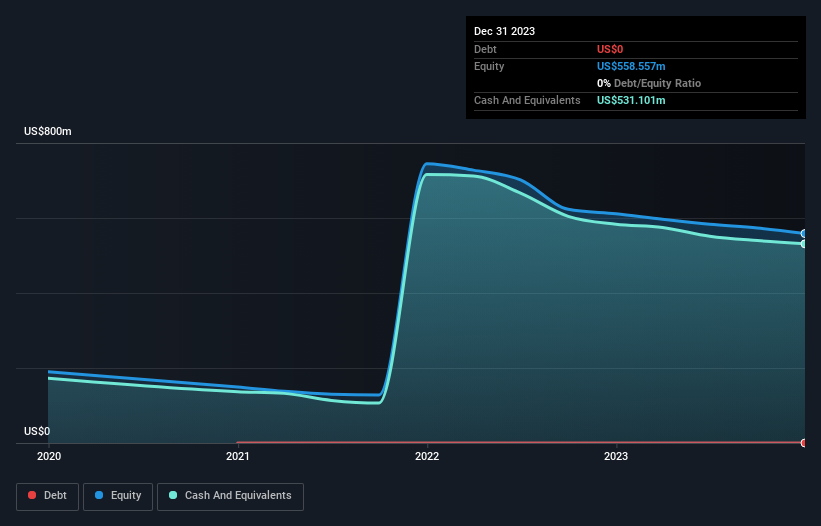Nextdoor Holdings (NYSE:KIND) Is In A Good Position To Deliver On Growth Plans
Just because a business does not make any money, does not mean that the stock will go down. For example, biotech and mining exploration companies often lose money for years before finding success with a new treatment or mineral discovery. But while the successes are well known, investors should not ignore the very many unprofitable companies that simply burn through all their cash and collapse.
Given this risk, we thought we'd take a look at whether Nextdoor Holdings (NYSE:KIND) shareholders should be worried about its cash burn. In this article, we define cash burn as its annual (negative) free cash flow, which is the amount of money a company spends each year to fund its growth. Let's start with an examination of the business' cash, relative to its cash burn.
Check out our latest analysis for Nextdoor Holdings
When Might Nextdoor Holdings Run Out Of Money?
A company's cash runway is calculated by dividing its cash hoard by its cash burn. As at December 2023, Nextdoor Holdings had cash of US$531m and no debt. In the last year, its cash burn was US$60m. So it had a cash runway of about 8.9 years from December 2023. Notably, however, analysts think that Nextdoor Holdings will break even (at a free cash flow level) before then. If that happens, then the length of its cash runway, today, would become a moot point. You can see how its cash balance has changed over time in the image below.
How Well Is Nextdoor Holdings Growing?
On balance, we think it's mildly positive that Nextdoor Holdings trimmed its cash burn by 6.5% over the last twelve months. And operating revenue was up by 2.6% too. In light of the data above, we're fairly sanguine about the business growth trajectory. While the past is always worth studying, it is the future that matters most of all. For that reason, it makes a lot of sense to take a look at our analyst forecasts for the company.
How Easily Can Nextdoor Holdings Raise Cash?
We are certainly impressed with the progress Nextdoor Holdings has made over the last year, but it is also worth considering how costly it would be if it wanted to raise more cash to fund faster growth. Generally speaking, a listed business can raise new cash through issuing shares or taking on debt. Many companies end up issuing new shares to fund future growth. By looking at a company's cash burn relative to its market capitalisation, we gain insight on how much shareholders would be diluted if the company needed to raise enough cash to cover another year's cash burn.
Nextdoor Holdings has a market capitalisation of US$803m and burnt through US$60m last year, which is 7.4% of the company's market value. Given that is a rather small percentage, it would probably be really easy for the company to fund another year's growth by issuing some new shares to investors, or even by taking out a loan.
How Risky Is Nextdoor Holdings' Cash Burn Situation?
As you can probably tell by now, we're not too worried about Nextdoor Holdings' cash burn. In particular, we think its cash runway stands out as evidence that the company is well on top of its spending. On this analysis its revenue growth was its weakest feature, but we are not concerned about it. Shareholders can take heart from the fact that analysts are forecasting it will reach breakeven. Based on the factors mentioned in this article, we think its cash burn situation warrants some attention from shareholders, but we don't think they should be worried. Its important for readers to be cognizant of the risks that can affect the company's operations, and we've picked out 2 warning signs for Nextdoor Holdings that investors should know when investing in the stock.
Of course Nextdoor Holdings may not be the best stock to buy. So you may wish to see this free collection of companies boasting high return on equity, or this list of stocks that insiders are buying.
Have feedback on this article? Concerned about the content? Get in touch with us directly. Alternatively, email editorial-team (at) simplywallst.com.
This article by Simply Wall St is general in nature. We provide commentary based on historical data and analyst forecasts only using an unbiased methodology and our articles are not intended to be financial advice. It does not constitute a recommendation to buy or sell any stock, and does not take account of your objectives, or your financial situation. We aim to bring you long-term focused analysis driven by fundamental data. Note that our analysis may not factor in the latest price-sensitive company announcements or qualitative material. Simply Wall St has no position in any stocks mentioned.

 Yahoo Finance
Yahoo Finance 
